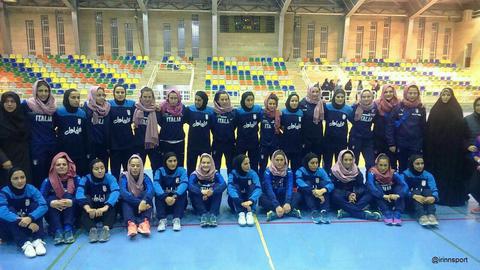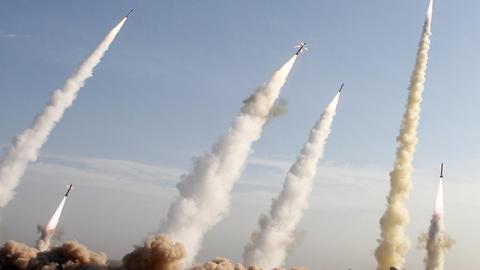An Iranian citizen journalist, who writes under a pseudonym to protect her identity, wrote the following article on the ground inside Iran.
Iran’s Football Federation has caused fresh controversy by placing tight restrictions on photography and video during international women’s futsal games.
The media restrictions followed an initial ban on both men and women attending female futsal matches, which the federation partially reversed at the last minute, allowing women spectators only into matches. The bans followed repeated refusals from international teams to cover their heads in line with Iranian federation recommendations, and met with protest from female futsal fans.
The Iranian women futsal team faced Italy in Tehran on Thursday, November 23. But prior to the match, on Saturday, November 18, the federation announced that spectators, reporters and photographers would not be allowed to attend the match. It later emerged that the decision was a response to Italian players’ refusal to wear the hijab and a uniform approved by Leila Sufizadeh, the Football Federation’s Deputy for Women.
But then, a day before the match, on November 22, the Football Federation released conflicting updates. Despite informing individual reporters that they could not go to the game, it then issued a statement saying: “The Iranian Women’s National Futsal Team will play against the Italian Women’s National Futsal Team on Thursday November 23 and Friday November 24. Both games will take place in the presence of women spectators and reporters.” The statement also explained that the public relations department for the Iranian Football Federation would have exclusive rights to images and videos of the games.
But while the controversies have mounted, the federation has been at pains to publicize its efforts to promote women’s futsal on the international stage. Leila Sufizadeh, the Football Federation’s Deputy for Women — whose role as federation deputy is more about security than it is about management — also said that negotiations to invite women’s futsal teams from China, Japan and Thailand to play in Tehran were ongoing.
A History of Controversy
Disputes and controversies over women’s futsal games have marred the sport over the last year or more. In October 2016, Russia’s Women Futsal Team came to Tehran to play a friendly with Iran’s women’s team. Needless to say, men were not able to attend. However, in a move that was not entirely unexpected, Iran’s Football Federation banned women too. Female spectators, photographers and reporters were all prohibited from attending the game because the Russian players were not wearing Islamic hijab. The Russian team had refused to accept the federation’s recommendation for them to cover up. Photographs of the game appeared on the Russian Football Federation’s website, but not on the Iranian Federation's site, or on any other Iranian news site.
In the second of the friendly games between the two teams, the Russians did comply with the Iranian federation’s requests and came on to the futsal court wearing the Islamic headscarf and federation-approved uniforms. But once again, the football federation refused to let in spectators, reporters and photographers.
Controlling Coverage
“One of the reasons that women’s futsal is not well received and few spectators come to games is the inadequacy of how the games are announced and advertised,” Shahrzad Mozaffar, the famed head coach of the Iranian Women’s National Futsal Team told the newspaper Ghanoon on November 23 [Persian link].
Plans to accommodate fans attending women’s futsal and football games are organized just one day ahead of the events taking place. And the football federation has shown little enthusiasm for media coverage of female futsal and football competitions. In fact, it only hosts women’s games — be it friendly or official matches — to fulfill its commitments to Asian and world football federations.
So the recent ban on woman spectators and reporters was lifted — provided people did not bring in cell phones or cameras — just one day before the first futsal game was due to take place between Iran and Italy. On Thursday, November 23, before the first game, female fans staged a 30-minute sit-in outside the sports center and refused to go in after security guards announced they would be searching fans and confiscating mobile phones to control how the event was recorded and photographed. Reporters said they would refuse to cover the event if authorities insisted on keeping the ban on mobile phones in place.
The media won their argument and were allowed to keep their phones — as long as reporters agreed not to take photographs. To ensure they complied, a female security agent from the Ministry of Sports monitored the reporters’ section of the stadium. Photojournalists were banned from attending altogether.
“Women’s Entry to Stadiums is a Right”
The Iran-Italy game featured a special guest: Parvaneh Salahshouri, the reformist chairwoman of Iranian parliament’s Women’s Caucus. Salahshouri has a long record of bringing up issues in sports and football, and she has also weighed in on gender discrimination. “Women’s entry to stadiums is not a privilege but a basic right,” she told the Iranian Students’ News Agency (ISNA) on September 23 [Persian link]. “Banning women from stadiums is the height of sexual discrimination.” She added that she could not comprehend it when, during a football match between Iran and Syria, Syrian female fans were allowed into the stadium, while Iranian women were forced to sit outside closed gates.
Salahshouri promised that she would bring the issue to the parliament soon, acknowledging that some parliamentarians supported the ban on women.
No Little Boys, Either!
Sitting next to Salahshouri at the game were 600 Iranian girls and women. Yet others were turned away. Despite officially being allowed to enter, many women had brought their young sons with them to the match, but were told the boys would not be able to accompany them indoors. So despite waiting outside with all the other female fans, women with young sons, ranging from three to eight years old in age, were prevented from entering.
Parvaneh Salahshouri, together with Fariba Mohammadian, the Deputy Sports Minister for Women and Leila Sufizadeh, attended the game. But it might have been an idea for them to spend some time near the entry gates so they could witness firsthand the problems spectators and the reporters encountered as they tried to enter. Despite the fact that this was a game played by women for women-only spectators, the women attending still faced obstacles.
In the end, the Iranian futsal team defeated the Italian team 3-1. Interestingly, under unrelenting pressure by Iranian players, two of the three winning goals were scored by the Italian defenders themselves. When the friendly was over, Iranian and Italian players posed for a commemorative photograph together. For the photo, the Italian athletes draped shawls over their hair to avoid the disapproval of the Islamic Republic.
And the next day, Friday, November 24, Iran’s team won again, this time 2-1. According to the football federation’s website, more than 800 spectators watched the game — without cameras, mobile phones or, we can assume, little boys. But perhaps the fact that they could watch the game at all signals progress. Well, kind of.
Sanaz Kalantari, Citizen journalist
visit the accountability section
In this section of Iran Wire, you can contact the officials and launch your campaign for various problems



























comments